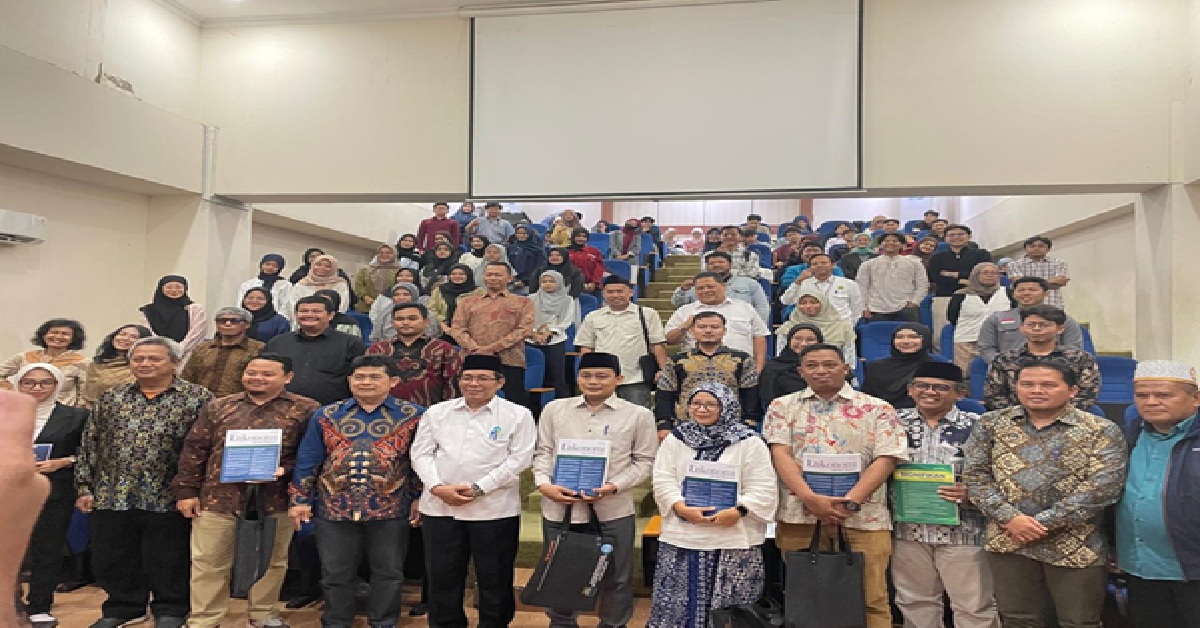The Sharia Economics Program held a seminar to disseminate the Judicial Review Decision on the Zakat Management Law.
Jakarta, October 7, 2025 — The Sharia Economics Study Program (PSEI) of the Faculty of Economics and Business (FEB) of UIN Syarif Hidayatullah Jakarta held a National Seminar on the Dissemination of the Judicial Review Decision of Law Number 23 of 2011 concerning Zakat Management on Tuesday, October 7, 2025. This event was a collaboration between PSEI FEB UIN Jakarta and the Zakat Forum (FOZ), featuring various speakers from legislators, the Ministry of Religious Affairs, zakat activists and practitioners, the Ombudsman, and academics.
In his remarks, the Dean of FEB UIN Jakarta, Prof. Dr. Ibnu Qizam, expressed his highest appreciation for the organization of this event. He stated that this national seminar is an important step for the academic world to participate in overseeing the revision process of Law Number 23 of 2011, while simultaneously strengthening the effectiveness of national zakat governance.
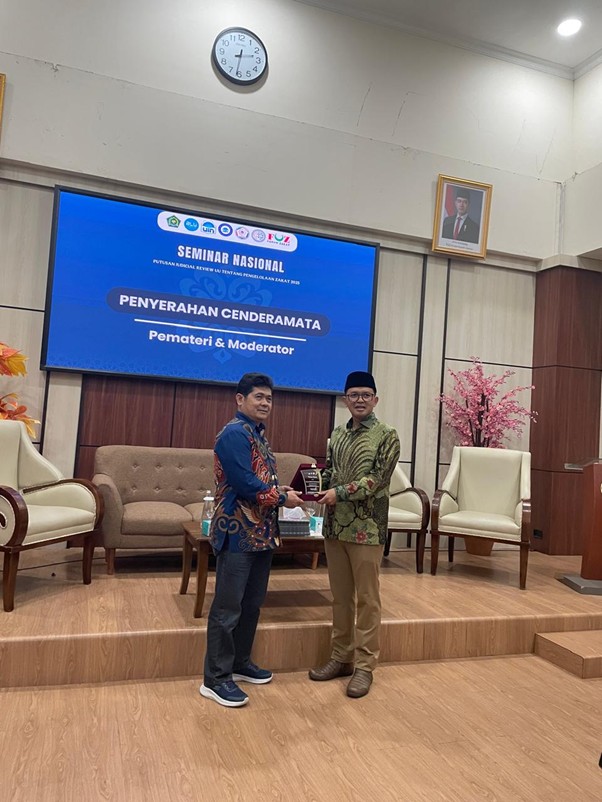
"Collaboration between universities and zakat stakeholders is crucial to ensure that the resulting regulations are not only normatively ideal but also effectively implemented," he said.
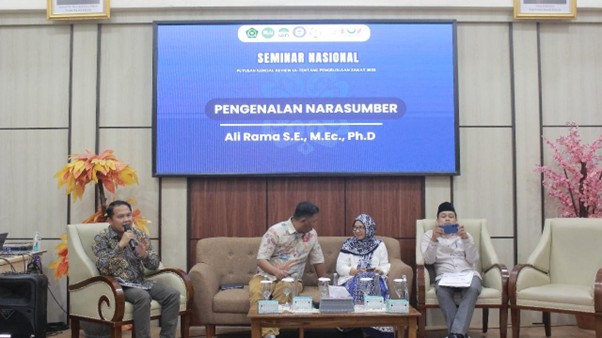
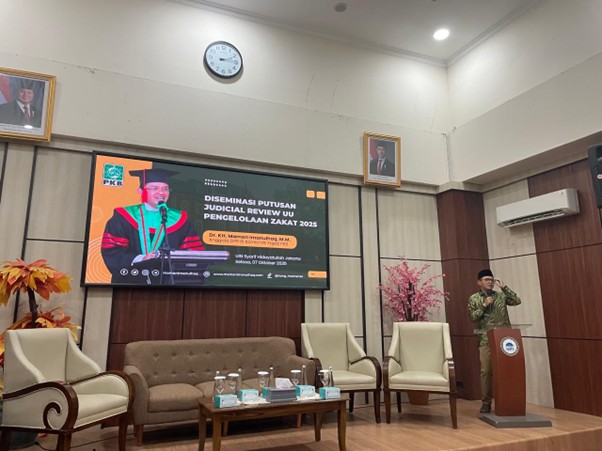
Meanwhile, Dr. K.H. Maman Imanul Haq, a member of Commission VIII of the Indonesian House of Representatives (DPR RI), in his opening speech stated that the Constitutional Court's (MK) Judicial Review decision opens up wider public participation in the revision of the Zakat Law.
"This revision must be carried out within two years, as mandated by the Constitutional Court's decision. We hope that the new law will strengthen zakat management institutions and build synergies so that zakat funds truly impact the people's economy," he said.
He also emphasized the importance of utilizing technology in zakat management. "Discussions about zakat should not stop at the religious level; they must also enter the digital economy. Technologies such as blockchain can increase transparency and accountability," he added
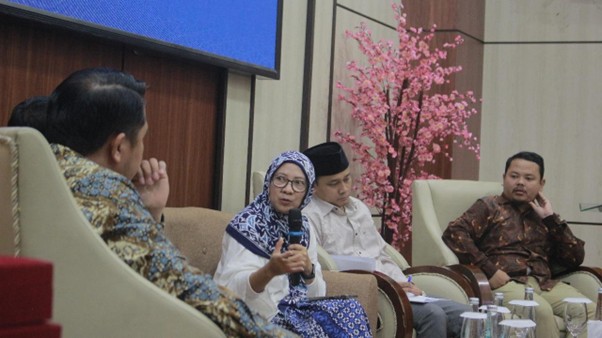
In his keynote speech, Prof. Dr. Waryono Abdul Ghafur, Director of Zakat and Waqf Empowerment at the Indonesian Ministry of Religious Affairs, emphasized that future revisions to the Zakat Law must strengthen the governance of zakat management institutions. "There needs to be clarity of function between regulators, supervisors, and operators so that it is not centralized in one institution. Equality between zakat management institutions must also be maintained," he explained.
The national seminar session, which took the form of a talk show, was moderated by Ali Rama, Ph.D., Head of the Sharia Economics Study Program, Faculty of Economics and Business, UIN Jakarta. In his introduction, he emphasized the importance of understanding the content of the lawsuit, the Constitutional Court's ruling, and strategic steps to improve national zakat governance.
Speakers in the discussion session included Prof. Amelia Fauzia, Ph.D., who explained that zakat management models in various countries fall into three main patterns: fully managed by civil society, fully managed by the state, and a hybrid model (a combination of the two). "The revision of the Zakat Law should actually strengthen the role of civil society, not limit it," he emphasized.
Ahmad Shobirin from the Indonesian Ombudsman highlighted a number of cases of zakat misuse in the regions caused by an overly centralized system. Meanwhile, Ibnu Tsani and Barman Wahidatan, petitioners for a judicial review to the Constitutional Court, emphasized the importance of equality between the National Zakat Collection Agency (BAZNAS) and the Zakat Collection Institutions (LAZ).
"LAZ should not be positioned as an auxiliary institution to BAZNAS. The two institutions must be equal and not subordinate to each other. Furthermore, the regulatory and supervisory functions should not be held by an institution that also acts as an operator," they explained.
The event, held in the 5th-floor Theater Room of the Faculty of Economics and Business, UIN Jakarta, was attended by more than 150 participants, consisting of students, academics, zakat activists and practitioners from various institutions. This seminar is expected to serve as an important forum for strengthening synergy between academics, policymakers, and zakat institutions in promoting national zakat governance that is fairer, more transparent, and has a broad impact on public welfare (AR).

